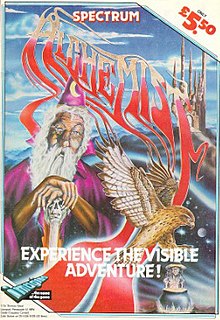 W
WAlchemist is an action-adventure game for the ZX Spectrum and released by Imagine Software in 1983. The player controls an alchemist who can shape-shift into a golden eagle.
 W
WArc of Yesod is a video game by Odin Computer Graphics. It was published in 1985 for the Sinclair Spectrum and Commodore 64. It is the sequel to Nodes of Yesod.
 W
WArmy Moves is a scrolling shooter game developed by Dinamic Software for the Amiga, Amstrad CPC, Atari ST, Commodore 64, MSX and ZX Spectrum. It is the first chapter of the Moves Trilogy and it was followed by Navy Moves in 1987 and Arctic Moves in 1995. It was first released in 1986 and published by Dinamic in Spain and by Imagine Software. Dinamic Software also developed a MS-DOS version of the game, published in 1989 in Spain.
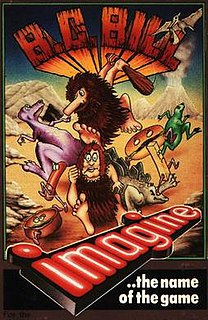 W
WB.C. Bill is a 2D action video game published by Imagine Software in 1984. It was released for the Commodore 64, ZX Spectrum, TRS-80 Color Computer, Dragon 32/64 and BBC Micro.
 W
WBatman: The Caped Crusader is an action-adventure game developed by Special FX Software and published by Ocean Software in 1988. It was licensed by Data East and Erbe Software for release in North American and Spain. It was the second of three unrelated Batman games released by Ocean, after Batman in 1986 and preceding Batman: The Movie in 1989. The Apple II version was developed by California-based Quicksilver Software; it requires a 128k IIe or IIc to run. As with many other Ocean releases, the C64 port came in separate cassette and disk releases; the North American NTSC version was based on the latter. The disk version contained slightly remixed music and differences in enemy spawns.
 W
WBlack Lamp is a platform game, originally published by Firebird Software for the Amiga, Atari ST, Commodore 64 and ZX Spectrum computers in 1988, and later published by Atari Corporation for the Atari 8-bit family in 1989.
 W
WBounces is a 1985 sports/fighting game released for the Commodore 64 and ZX Spectrum.
 W
WCosmic Cruiser is a game developed by Imagine Software and released for the BBC Micro, Commodore 64, Dragon 32, and ZX Spectrum in 1984. The object of the game is to fight off an alien raiding party that has taken over a distant space station and save the crew.
 W
WEye of Horus is a computer game published in 1989 by Fanfare for the Amiga.
 W
WFrankie Goes to Hollywood is a computer game that was developed by Denton Designs and published by Ocean Software Ltd in 1985 for the Commodore 64, Amstrad CPC and ZX Spectrum home computers. The game is based on music, imagery and slogans of the UK band Frankie Goes to Hollywood.
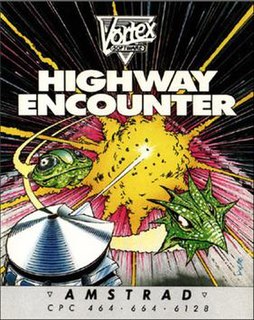 W
WHighway Encounter is a video game published for the ZX Spectrum, Amstrad CPC, MSX, Commodore 64, Sharp MZ, and Tatung Einstein by Vortex Software in 1985. It was written by Costa Panayi who also coded Android, Android Two, TLL, Cyclone, and Revolution.
 W
WThe Legend of Kage is a side-scrolling hack-and-slash action game developed and released by Taito for arcades in 1985. It was ported for several contemporary video game home systems in the following years.
 W
WMagMax is an arcade game which was developed by Nihon Bussan and released in 1985 under its brand Nichibutsu. A horizontal scrolling shooter, players control the title hover ship in an attempt to completely construct the ship into a giant robot and to destroy any enemies attempting to stop it.
 W
WMario Bros. is a 1983 platform game developed and published for arcades by Nintendo. It was designed by Shigeru Miyamoto and Gunpei Yokoi, Nintendo's chief engineer. Italian plumber Mario and his twin brother Luigi exterminate creatures emerging from the sewers by knocking them upside-down and kicking them away. It is part of the Mario franchise, but originally began as a spin-off from the Donkey Kong series.
 W
WMermaid Madness is an action-adventure game developed by Soft Design and published by Electric Dreams Software for the Amstrad CPC, Commodore 64, and ZX Spectrum in 1986.
 W
WNodes of Yesod is a video game developed and published by Odin Computer Graphics in 1985. The game is similar to Underwurlde, which was released a year earlier, and the later Metroid.
 W
WPedro is a video game developed by Frank Johnson, Aidan Rajswing, Bryce Ducharm, Andrew Impson, Brian Carpenter and Steve Cain for the ZX Spectrum and released by Imagine Software in 1984. The game uses oblique projection to give the impression of three dimensional graphics.
 W
WNekketsu Kōha Kunio-kun , released as Renegade in the West, is a beat 'em up video game developed by Technōs Japan and distributed by Taito for the arcades in 1986. In the original Japanese version Nekketsu Kōha Kunio-kun, the game revolves around a high-school delinquent named Kunio-kun who must stand up against a series of rival gangs frequently targeting his classmate Hiroshi. In the Western version Renegade, the player controls a street brawler who must face four different gangs in order to rescue his girlfriend being held captive by a mob boss.
 W
WRoad Runner is a racing game based on the Wile E. Coyote and Road Runner shorts. It was released by Atari Games in 1985.
 W
WRobin of the Wood is a maze game published in 1985 for several 8-bit computer formats by Odin Computer Graphics in the UK and Serma Software in Spain. It was based on the English legend of Robin Hood.
 W
WShadowfire is a computer game for the Sinclair ZX Spectrum and Commodore 64 and later released for the Amstrad CPC. It was developed by British developer Denton Designs and published by Beyond Software in 1985. The player must direct the Enigma Force to rescue Ambassador Kryxix from the traitor Zoff's flagship before the timer runs out and secret plans for a new type of starship are discovered. Shadowfire was one of the first games to use a menu-and-icon-driven interface, even with a lightpen. It was well received by reviewers of the time, and followed by a sequel, Enigma Force, in 1986.
 W
WStar Goose is a vertically scrolling shooter that was published for the Amiga, Atari ST, and MS-DOS by Logotron in 1988. The player controls Scouser-Gitt, who pilots the eponymous Star Goose, a vessel that has been commissioned to scour the planet Nom and collect 48 crystals. Players must collect all six crystals in each of the game's eight levels to advance, while at the same time avoiding or destroying enemies and maintaining their shield, ammunition, and fuel levels. The game's surfaces are contoured, which affects the way that bullets travel, and contain tunnels that switch modes to a three-dimensional perspective where the player can replenish their resources.
 W
WThe Transformers is a platform shoot 'em up game based on the Transformers franchise. It was written by Denton Designs and released by Ocean Software for the Sinclair Spectrum and Commodore 64 home computers in 1986.
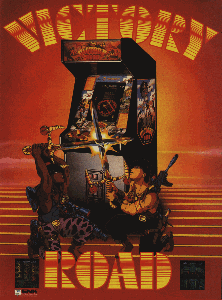 W
WVictory Road, known as Dogō Sōken in Japan, is a run-and-gun shooter video game released by SNK for arcades in 1986. It is the sequel to Ikari Warriors.
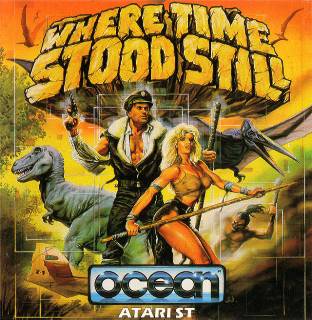 W
WWhere Time Stood Still is an isometric action-adventure game released by Ocean in 1988 for the Sinclair Spectrum 128K, MS-DOS and Atari ST. The game was ported by fans to Amiga in July 2014, and on Amiga CD32 in December 2014 and was converted from the Atari ST version with some enhancements which were not present in other iterations. A Commodore 64 version was considered but never started. The game was produced by Denton Designs as a follow-up to The Great Escape from 1986.